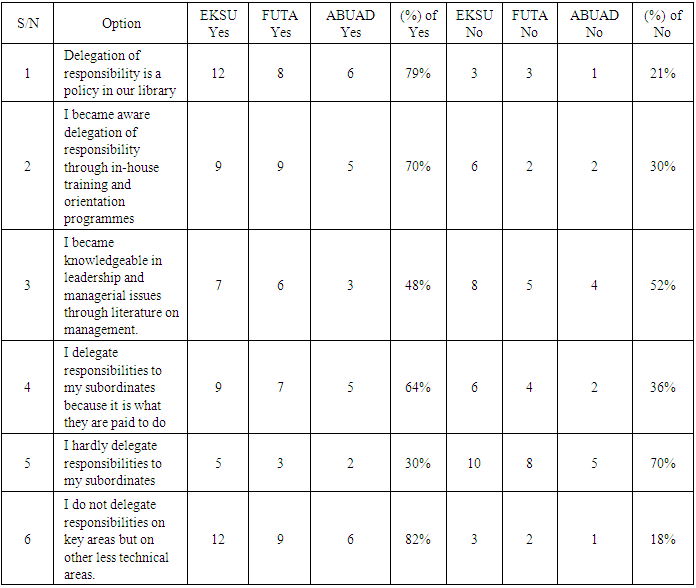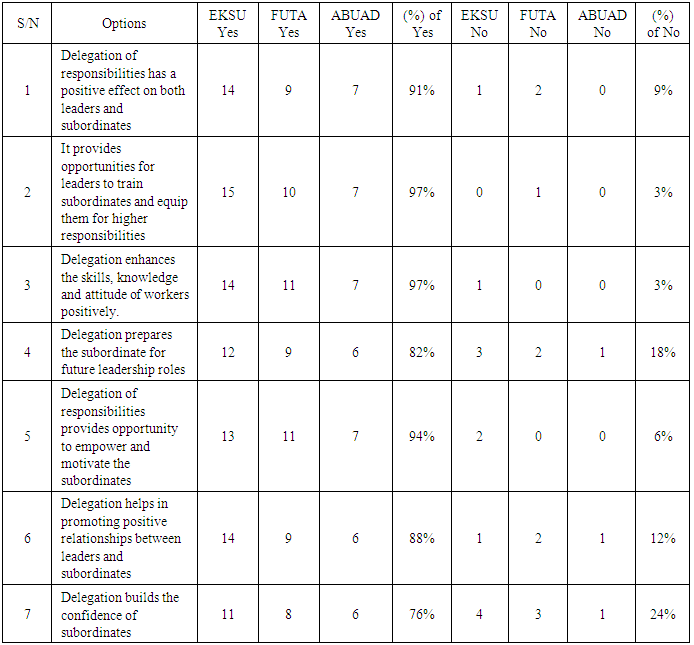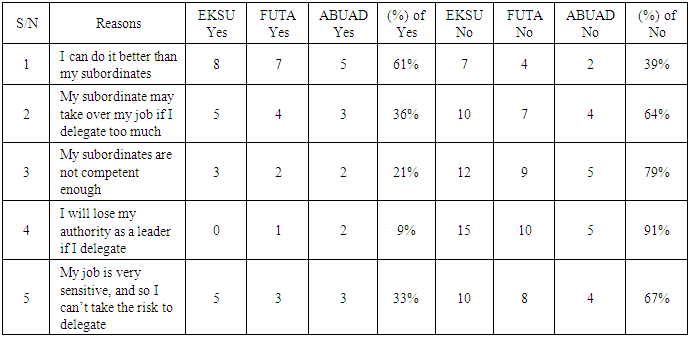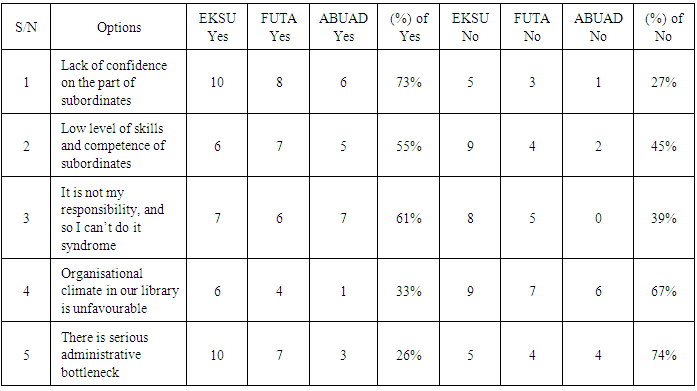-
Paper Information
- Paper Submission
-
Journal Information
- About This Journal
- Editorial Board
- Current Issue
- Archive
- Author Guidelines
- Contact Us
International Journal of Library Science
p-ISSN: 2168-488X e-ISSN: 2168-4901
2017; 6(4): 69-76
doi:10.5923/j.library.20170604.01

Delegation of Responsibilities: A Leadership Tool for Subordinates’ Competence Development in Selected Academic Libraries in Nigeria
Bamidele Olawale, Awoyemi Olubunmi O.
University Library, Ekiti State University, Ado Ekiti, Nigeria
Correspondence to: Awoyemi Olubunmi O., University Library, Ekiti State University, Ado Ekiti, Nigeria.
| Email: |  |
Copyright © 2017 Scientific & Academic Publishing. All Rights Reserved.
This work is licensed under the Creative Commons Attribution International License (CC BY).
http://creativecommons.org/licenses/by/4.0/

Delegation of responsibilities constitutes a very important ingredient of good leadership in academic libraries and is critical to competence development of junior and upcoming librarians; however, experience has shown that many leaders are unwilling to delegate responsibilities for a number of reasons. This research work is designed to investigate delegation of responsibilities as a tool for competence development of subordinates in selected academic libraries. The study adopted a survey research method and utilise questionnaire to generate data. Out of the forty (40) copies of questionnaire distributed, only thirty three (33) copies (82.5%) were returned with valid responses. The use of frequency count and percentages method of data analysis was adopted for the research work. Findings revealed that delegation of responsibilities is a vital tool for developing, equipping and motivating subordinates with positive effects on subordinates’ job performance. The study also showed that lack of confidence in subordinates, low level of skills and bureaucracy were some of the challenges to delegation of responsibilities in the surveyed libraries. However, it was recommended that academic libraries should promote a culture and climate where leaders are ready and willing to build the capacity, confidence and competence of junior librarians and library officers which will ultimately translate to higher productivity of the library as a whole.
Keywords: Delegation of Responsibilities, Subordinates, Leadership Tool, Competence Development, Librarians, Academic Libraries
Cite this paper: Bamidele Olawale, Awoyemi Olubunmi O., Delegation of Responsibilities: A Leadership Tool for Subordinates’ Competence Development in Selected Academic Libraries in Nigeria, International Journal of Library Science, Vol. 6 No. 4, 2017, pp. 69-76. doi: 10.5923/j.library.20170604.01.
Article Outline
1. Introduction
- The role of leadership in organisations and how it impacts on subordinates’ abilities cannot be over emphasised. Udegbe (2003) defines leadership as a process of charting a course and influencing others to follow. According to Adefuye (2003), the complexity of the leadership process cannot be revealed without considering the dynamic interaction between the leader and the follower. Leadership therefore, depends on an interactional context which includes how employees view a leader’s performance, approach and expectations of and from the subordinates. Leadership is so powerful that it gives pace and energy to the workforce and empowers them. When the workforce is empowered, they feel significant, and they are pulled rather than pushed towards the organisational goals. When there is a positive dynamics between leaders and subordinates, it boosts the morale of the latter and they become more willing to associate with the leaders and organisational process.Terry and Franklin (2003) conceived leadership as the relationship in which one person regarded as leader influences others to work together willingly on related tasks to attain goals desired by the leader and the group. For Yuki (2002) leadership connotes the lifting of peoples’ vision to higher sight; the raising of their performance to a higher standard; and the building their personality beyond limitations. On his part, Mullins (1996) sees leadership essentially as a relationship through which one person influences the behaviour or actions of other people. This, according to Mullins, means that the process of leadership cannot be separated from the activities of groups with effective team building. From the foregoing, the definition of leadership within the context of a library community may be proposed to mean, the ability to galvanise members of the organisation towards the direction deemed desirable, as well as the capacity to deliver the expected benefits to subordinates.The success or failure of any organisation is attributable to its leadership who inspire and direct their subordinates and motivate them for additional responsibilities. This implies that in order to maximize the efforts and productivity of a workforce, a formal effective leadership must be in place. This leadership must be task-oriented with the ability to influence the workers towards achievement of personal and organisational goals. Effective leaders would combine practical strategies and interpersonal procedures to create commitment and loyalty which would generate outcomes that would give the organisation a competitive edge. Leadership revolves around human relationships. This relationship is between those in positions of authority and those who are expected to obey and follow their directives and guidelines. Success in leading, then becomes dependent upon the capacity of the leader to build and nurture those relationships that cause people to do extraordinary things (Adewusi, 2015). Leadership is the life wire of any library and its importance cannot be over-emphasised. It is a kind of direction a person can give a group of people under him in such a way that will influence the behaviour of another individual, or group (Omolawal, 2009). From the foregoing, it is safe to say that human resources are the most viable source of achieving competitive advantage in contemporary organisations.Libraries have the hierarchical structure of management. Policies are formulated at the apex and passed down the chain of authority for implementation. Leaders in a library are head of the libraries, departments, sections and units. They manage the work performance of their subordinates through duty scheduling, coordination of routine activities, supervising, delegating, evaluating and disciplining as the need arises (Onyeonoru, 2005). ICT has brought challenges to leadership in libraries by creating a dynamic environment which is constantly changing through technological innovations that require human adaptation. To meet these challenges and survive in the changing world, library leaders need clusters of competencies that will empower them to remain in control, innovative and achieve defined objectives. Empirical research highlight clusters of competencies which enable leaders to excel in organisations. These are intellectual/ cognitive abilities, self management/ intrapersonal abilities and relationship management/ interpersonal abilities (Mulder, 2001).On the other hand, competencies are defined as the knowledge, skills, and abilities that define and contribute to performance in a particular profession. They are described so that they can be observed, measured, and rated. When a series of competencies is organized together a framework is created that differentiates among basic, advanced and expert. Competencies create a common bond of understanding and a common language for defining professional standards. Competencies are the foundation for competency based management and continuous process improvement ensuring that librarians have the knowledge, skills and abilities to accomplish mission requirements. They are used to design and develop training and educational programmes, position descriptions, and performance evaluation instruments and for alignment with strategic objectives. There are some competencies that are shared by all members of the profession regardless of their domain orientation or level. These competencies are called “Shared Competencies” (Gill, 2011).These competencies are focused on the abilities, skills, and knowledge that makes reference and user services librarians unique from other professionals. Competencies are defined as behaviours that excellent performers exhibit more consistently and effectively than average performers. A behavioural basis is necessary because effective assessment of competencies depends on observed behaviour. Reference librarians are defined as librarians that assist, advice, and instruct users in accessing all forms of recorded knowledge. The assistance, advice, and instruction include both direct and indirect service to users. Competencies must be relevant to the particular job requirements; therefore, individuals and organizations applying these guidelines may wish to select those strategies for meeting the competency goals that are most appropriate to their situation. At the international level, IFLA Digital Reference Guidelines had not been developed further to a document explicitly on competencies (Raven and Stephenson, 2001).Aloko, (2010) wrote about core skills and competencies, stressing the fact that usually wider environments in which people work fail to recognise complexities of reference work and the contribution that the information professional makes to keeping accessible relevant information available from the desk top. Library profession must determine its core business, create a value proposition and utilise its core competencies to deliver outcomes aligned to the strategic objectives of its funding body. Professionalism has to be a central player in the digitised information landscape. Academic librarians are being asked to take on a wider range of roles on their campuses and they need a framework for their professional development.
2. Leadership and Mentoring in Academic Libraries
- Mentoring refers to a personal developmental relationship in which a more experienced or knowledgeable person helps a less experienced or less knowledgeable person. It is a process of sharing knowledge on work/career related activities for professional development. It is to develop another’s capabilities through a one-on-one relationship (Oke, 2006). Leadership skills required of a professional librarian must be acquired along the way or on the job. Librarians need to develop excellent people’s skills and learn human resources policies and practices. Becoming a good leader is a slow process. Most learn through first serving as assistant or associate positions or by shadowing the person they will assist or succeed. Some have the extraordinary luck to be at a library which actually has effective leadership programmes. Good mentoring relationship is a two way thing that involves the cooperation of the mentor and the mentee. The mentor benefits by being there and watching the mentee grow in his career. Teach someone if you want to know how much you have learnt, mentor someone if you want to know how valuable you are to those around you. Good mentors are those that enjoy being on immense value to others and seeing good things happen to those they care about. Effective mentoring is observed to assist librarians with diverse backgrounds growing in the profession (Zhang et.al, 2007). Mentoring in librarianship is in many ways like other forms of mentoring, the mentor is an adviser, a consultant, a role model and a senior colleague and the rewards come when your protégé succeeds. Administration in libraries includes a variety of positions that involves managing groups of various sizes and compositions such as departments and units. It typically involves hiring and firing, resource allocation, managing the changing and complex library environment and coordinating staff and readers (Gill, 2011).Mentoring has been acknowledged to orient younger librarians in the field as well as address diverse questions of mid-career librarians (Martorana et.al. 2004). A study on the effect of coaching and mentoring on librarians in Makerere University, by Nassali (2009) reveals that through guidance over procedural obstacles and challenges, young librarians’ opinions changed from perceiving, LIS as desert profession to seeing it as more challenging. The respondents afterwards developed love for the profession and became proud librarians. Mentoring has been affirmed to challenge mentees’ thinking, increase self-awareness, improve mentees’ ability to create relationships which sustains independent and confident spirit (Clutterbuck and Abbott 2009).
3. Leadership and Subordinates’ Performance in Academic Libraries
- Denison (1990) claims that leadership is perhaps the most carefully investigated organisational variable that has a potential impact on employee performance. Successful leaders understand what motivates subordinates and how the subordinates’ strength and weaknesses influence their decisions, actions and relationships. It is generally accepted that the performance of any group of people is largely dependent on the quality of its leadership. Effective leadership performance facilitates the attainment of the subordinates’ desires which results in effective performance (Akinyele, 2007). Billings and Lounsbury (2000) confirmed the link between high performance and leadership in the United States by developing a model of charismatic/ transformational leadership where the leaders’ behaviour is said to give rise to inspiration, fear and empowerment in their subordinates, resulting in exceptionally high effort, commitment and motivation to take risks. Effective leadership helps to develop team spirit and the integration of individual and group goals (Odanye, 2004).Apart from directing and influencing subordinates, leadership also has the responsibility of developing the competence of subordinates by providing opportunities for them to take risks and act in various capacities. One of the major tools of doing this is delegation of responsibilities. No leader, no matter how competent, can do all the work alone; his responsibilities are always greater than his personal capacity to carry them out (Collin, 1989; Mulder, 2001). Leaders in academic libraries need to delegate parts of their responsibilities and authority to their subordinates. Delegation of responsibilities is a primary leadership tool; a process that allows supervisors to share some of their assigned responsibilities with subordinates, thereby gaining valuable time to complete other assignments (Eraut, 2004). Delegation not only frees leaders for more important things, but can motivate competent subordinates. Leaders must be careful not to delegate too much. Angst and Browieck (2013) opined that ineffective leaders delegate nothing, the mediocre leaders delegate everything, while the effective leaders delegate selectively. Leaders must delegate as much as practically possible while retaining control over key result areas, so as to enable them monitor the result.Delegation empowers a subordinate to make decisions; it is a shift of decision making authority from a higher organisational level to a lower one. Delegation if properly done is not abdication. In general delegation is good and can save money and time, help in building skills and motivate people. Poor delegation, on the other hand, might cause frustration and confusion to all the involved parties (Ahmed and Jensen, 2009; Angst and Browieck, 2013).According to Alos (2002) one common characteristic of effective leaders is that they are usually surrounded by capable subordinates. They are not afraid of the strength in their subordinates. In fact they want strong subordinates by their side. This is because they hold themselves ultimately responsible for the mistakes of their subordinates. Alos goes further to argue that an effective leader knows that there is a risk in having competent subordinates, but such leader also realises that it is much smaller risk than to be served by mediocrity, because when subordinates lack self-confidence and when their skill level is low, it poses a big threat to leadership and the organisation which may affect the pattern of relationship in the organisation. The leader therefore needs to know that the greatest task of leadership is to create human energies and vision.
4. Librarians’ Competence Development and Performance
- Competence refers to the ability of a librarian to do his job. It is also what he needs to be successful on his job. This includes all the related knowledge, skills, abilities and attributes fit for a librarian’s job. It provides the library with a way to define in behavioural terms, what it is that librarians need to do to produce the results that the library desires (Mulder, 2001). The process of enhancing that ability is referred to as competence development. Competence development refers to professional and personal development of each librarian in line with the library’s core values, goals and vision. Some scholars see competence as a combination of practical and theoretical knowledge, cognitive skills, behaviour and values used to improve performance; or as the state or quality of being adequately or well qualified, having the ability to perform a specific role (Eraut, 2004; Mulder, 2001; Raven and Stephenson, 2001).Where the competence level is high, it translates to higher performance on the part of the librarians. Performance, according to Onyeonoru (2005), is the amount of successful role achievement. He goes further to refer to it as the product of ability combined with motivation; ability is the product of aptitude i.e. inherent abilities or skills sharpened by training and resources; motivation is the product of desire and commitment in the right direction. On the other hand, lack of ability may be traced to low competence which is defined by the level of knowledge, skills and attitude, while motivation is seen as the willingness to expend energy to achieve a goal. This position is buttressed by Adefuye (2003) that high commitment of employees will result in increased motivation and overall organisational performance.
5. Challenges to Effective Delegation in Academic Libraries
- Delegation is essential in academic libraries, yet even though required, there are challenges that seem to hamper the delegation process. According to Eraut (2004) these include, a fear that subordinate will not do a job satisfactorily, inability to encourage cooperation among subordinates, a feeling that leaders do not have to develop subordinates, a feeling that delegation diminishes leadership’s authority, the absence of controls that warn leaders of impending difficulties, thus causing them to be cautious about delegating responsibilities. Adefuye (2003) opined that some leaders may not be willing to delegate because of the fear of being undermined by subordinates, some of whom are better qualified on paper or have been better exposed.It is quite difficult for a delegator to bestow upon another complete authority and responsibilities. It is unusual to find a person in whom the delegator has so much confidence that supervision is not necessary (Ahmed and Jenson, 2009). It is important in each case of delegation to steer a course mid-way between two extremes; on one hand the extreme of laissez-faire attitudes, in which the delegator follows a hand-off policy, and on the other hand the extreme of over supervision, that can annoy the subordinate by constant inquiry and checking.Subordinate, however, may need the help of the delegator. To avoid the risk of the subordinate blindly accepting the leader’s decision as best, or becoming over dependent on the boss, the leader should take time to talk at length to raise questions that will lead the subordinate to think constructively about the assignment delegated. As the work progresses, the subordinates may occasionally check to reaffirm a sense of direction, or the leader may make judicious inquiries to see how the subordinate is doing (Triple creek, 2009).It is of great importance for the leader to know what must not be delegated to the subordinates. These are policy making and interpretation, executive actions such as making changes in the organisational structure of the library, disciplinary powers, a duplication of one’s own power and the final responsibility for success and failure. Since leaders retain the ultimate responsibility for the performance of the job delegated, delegation of authority also usually entails the creation of accountability. Thus, subordinates automatically become accountable for the job delegated (Bolden et.al 2012).Finally, a reasonable approach to delegation of responsibilities is that the subordinate’s results should be the desired objective. The duties delegated must be commensurate with the authority given. The delegator remains the final arbiter of results. But considerable latitude can be allowed where the subordinate is competent. He should be left to determine how to do the job and trusted to work cooperatively and efficiently with others, most subordinates would perform well under such autonomy (Olabode, 2007). To accomplish effective delegation, it is important that the subordinate should understand the purpose of delegated functions and the objectives to be achieved. The determination of the objectives helps the subordinates to relate the assigned tasks to the accomplishment of the overall library objectives.
6. Objectives of the Study
- The main objective of this study is to investigate delegation of responsibilities as a leadership tool for subordinates’ competence development in selected academic libraries in Nigeria. The specific objectives are to:1. investigate the levels of delegation of responsibilities in the surveyed libraries2. find out the knowledge, perception and attitude of leaders on delegation of responsibilities.3. identify reasons why leaders are unwilling to delegate responsibilities4. determine the effects of delegation of responsibilities on subordinates performance5. ascertain the challenges to delegation of responsibilities among leaders in the surveyed libraries.
7. Research Methodology
- The descriptive survey method was adopted for the study and data were generated through the use of questionnaire. The target population of this research work were the University Librarians, Faculty Librarians, Heads of Departments, Units and Section of Ekiti State University, Ado Ekiti, Ekiti State, Nigeria, Federal University of Technology, Akure, Ondo Satte, Nigeria and Afe Babalola University, Ado Ekiti, Ekiti State, Nigeria. Items in the questionnaire focused on the Knowledge, Attitude and Perception of Delegation of Responsibilities; Effect of Delegation of responsibilities on Subordinates’ Performance; Reasons for Leaders’ Unwillingness to Delegate responsibilities; Challenges to Effective Delegation in Academic Libraries. Total enumeration sampling technique was adopted for the study. Data were analysed using frequency count and percentage.
8. Presentation and Discussion of Results
- Below is the comprehensive analysis of data and findings based on the responses received from the respondents through the use of questionnaire. Out of the forty (40) copies of questionnaire distributed, thirty three (33) copies were returned with valid responses which represent 82.5% response rate for the study.
|
|
|
|
|
|
9. Conclusions and Recommendations
- Delegation of responsibilities is a vital tool in the hands of leaders in academic libraries in developing the competence level of their subordinates. It has the capacity to empower the subordinates and expose them to responsibilities which may have positive implications for future leadership roles. It also provides them with opportunities to develop self-confidence and see themselves as being capable of contributing to the achievement of overall library goals. Academic libraries should therefore promote a culture and climate where leaders are ready and willing to build the capacity, confidence and competence of junior librarians and library officers which will ultimately translate to higher productivity of the library as a whole.
 Abstract
Abstract Reference
Reference Full-Text PDF
Full-Text PDF Full-text HTML
Full-text HTML




